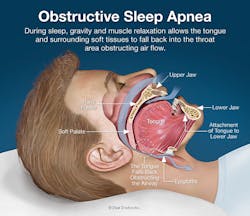A new sleep apnea white paper issued by the American Transportation Research Institute (ATRI) and based on a survey of over 800 truck drivers finds that the cost of sleep apnea treatments is hitting them hard in the wallet, with out-of-pocket expenses for treatment averaging $1,220 or some 1.5 weeks of median drive pay.
Other findings by the group include:
- Among drivers who had been referred to a sleep study, 53% paid some or all of the test costs, with an average of $1,220 in out-of-pocket expenses.
- Health insurance assistance with sleep study costs impacted driver out-of-pocket costs significantly as 61% of drivers with no health care coverage of their sleep study incurred out-of-pocket costs exceeding $1,000 compared to 32% of drivers whose health insurance did cover some portion of the sleep study with costs exceeding $1,000.
- Use of a continuous positive airway pressure (CPAP) machine is the most commonly prescribed treatment regimen for drivers diagnosed with obstructive sleep apnea (OSA) – even for those with mild sleep apnea, which does not require treatment in order to be medically certified to drive, ATRI said.
- Only 1.95% of drivers suffering from moderate to severe OSA diagnosed and prescribed treatment failed to adhere to that treatment.
- As OSA diagnosis severity increases, drivers experienced more positive CPAP treatment effects. For example, drivers diagnosed with severe OSA and being treated with CPAP reported increased amounts of sleep (84%), feeling better when they wake up (71%), and lower blood pressure (75%).
- Conversely, among the 91% of drivers being treated with CPAP -- despite a diagnosis of mild sleep apnea -- less than a third (32%) experienced improved sleep as a result of CPAP treatment.
- Among drivers who have had sleep studies and those who have not, there is concern about the use of neck circumference and Body Mass Index (BMI) as measures to refer drivers to sleep studies.
- Additionally, among drivers who have been tested, 64% believe that the DOT guidelines for referring drivers are too broad and that medical examiners do not follow the guidelines for referrals to sleep studies.
About the Author
Fleet Owner Staff
Our Editorial Team
Kevin Jones, Editorial Director, Commercial Vehicle Group
Cristina Commendatore, Executive Editor
Scott Achelpohl, Managing Editor
Josh Fisher, Senior Editor
Catharine Conway, Digital Editor
Eric Van Egeren, Art Director
Sign up for our eNewsletters
Get the latest news and updates
